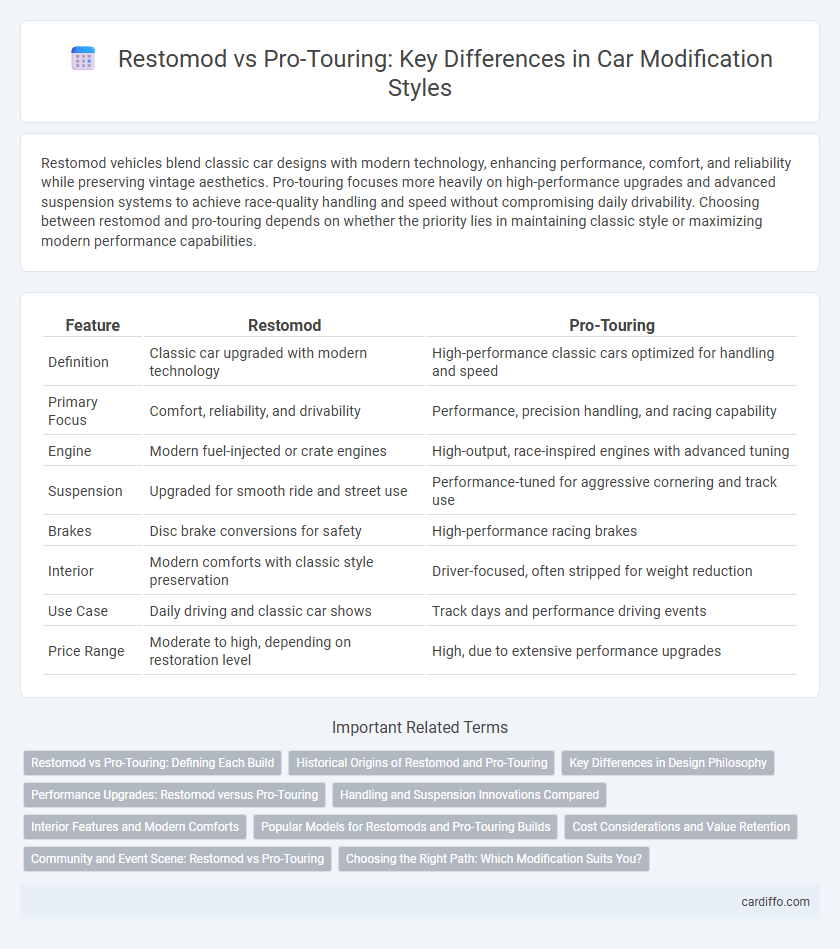Restomod vehicles blend classic car designs with modern technology, enhancing performance, comfort, and reliability while preserving vintage aesthetics. Pro-touring focuses more heavily on high-performance upgrades and advanced suspension systems to achieve race-quality handling and speed without compromising daily drivability. Choosing between restomod and pro-touring depends on whether the priority lies in maintaining classic style or maximizing modern performance capabilities.
Table of Comparison
| Feature | Restomod | Pro-Touring |
|---|---|---|
| Definition | Classic car upgraded with modern technology | High-performance classic cars optimized for handling and speed |
| Primary Focus | Comfort, reliability, and drivability | Performance, precision handling, and racing capability |
| Engine | Modern fuel-injected or crate engines | High-output, race-inspired engines with advanced tuning |
| Suspension | Upgraded for smooth ride and street use | Performance-tuned for aggressive cornering and track use |
| Brakes | Disc brake conversions for safety | High-performance racing brakes |
| Interior | Modern comforts with classic style preservation | Driver-focused, often stripped for weight reduction |
| Use Case | Daily driving and classic car shows | Track days and performance driving events |
| Price Range | Moderate to high, depending on restoration level | High, due to extensive performance upgrades |
Restomod vs Pro-Touring: Defining Each Build
Restomod vehicles blend classic car aesthetics with modern technology, emphasizing authenticity and comfort by updating original components like engines, suspensions, and interiors for improved performance and reliability. Pro-touring builds prioritize high-performance modifications with advanced engineering, including upgraded braking systems, suspension tuning, and contemporary horsepower enhancements for superior handling and speed. Both styles respect the vintage foundation but diverge in goals--restomod aims for a refined classic experience, while pro-touring focuses on race-ready capabilities.
Historical Origins of Restomod and Pro-Touring
Restomod originated in the late 20th century as enthusiasts sought to preserve classic car aesthetics while integrating modern performance parts and technology for improved reliability and comfort. Pro-touring emerged in the early 2000s, emphasizing high-performance upgrades tailored for driving dynamics, including enhanced suspension, brakes, and engine tuning, often transforming muscle cars into track-ready machines. Both styles trace their roots to a passion for blending heritage with innovation, but restomod prioritizes maintaining original design, whereas pro-touring focuses on cutting-edge performance.
Key Differences in Design Philosophy
Restomod focuses on preserving the original classic car's authenticity while integrating modern technology for enhanced performance and comfort. Pro-touring emphasizes aggressive performance upgrades and handling improvements, often transforming the vehicle into a high-powered, track-ready machine. The core design philosophy of restomod appeals to enthusiasts valuing nostalgia and subtle enhancement, whereas pro-touring targets those prioritizing cutting-edge performance and aggressive aesthetics.
Performance Upgrades: Restomod versus Pro-Touring
Performance upgrades in restomod projects emphasize a blend of classic aesthetics with modern drivability, incorporating engine swaps, suspension improvements, and upgraded braking systems to enhance reliability and comfort while retaining vintage appeal. Pro-touring modifications prioritize high-performance capabilities by utilizing cutting-edge technology such as advanced suspension geometry, high-horsepower powertrains, and track-ready brake setups to achieve superior handling, acceleration, and braking on both road and race environments. Both approaches leverage performance enhancements but restomods focus on balance and originality, whereas pro-touring targets competitive sports performance and aggressive driving dynamics.
Handling and Suspension Innovations Compared
Restomod focuses on preserving classic aesthetics while integrating modern suspension systems like coilovers and upgraded sway bars to enhance ride comfort and handling precision. Pro-touring emphasizes high-performance handling innovations, including adjustable suspension geometry, hydraulic bump stops, and lightweight control arms, designed to deliver superior cornering and braking capabilities. Both approaches leverage technological advancements, but pro-touring prioritizes aggressive track-ready suspension setups, whereas restomod balances modern performance with vintage driving dynamics.
Interior Features and Modern Comforts
Restomod interiors emphasize preserving classic aesthetics while integrating modern conveniences such as upgraded sound systems, air conditioning, and enhanced seating materials that maintain vintage appeal. Pro-touring vehicles prioritize advanced ergonomic designs with high-performance seats, digital instrument clusters, and state-of-the-art infotainment systems to provide both comfort and cutting-edge functionality. Both approaches balance classic style with modern comfort but differ in execution, with restomod leaning toward authenticity and pro-touring toward high-tech sophistication.
Popular Models for Restomods and Pro-Touring Builds
Popular models for restomods often include classic muscle cars like the Chevrolet Camaro, Ford Mustang, and Pontiac GTO, prized for their timeless design and strong aftermarket support. Pro-touring builds frequently feature vehicles such as the Chevrolet Corvette, Chevrolet Chevelle, and Dodge Charger, known for combining vintage aesthetics with modern performance upgrades. Both styles emphasize enhancing original models with advanced suspension, braking systems, and powerful engine swaps to create custom vehicles tailored to driving dynamics and style preferences.
Cost Considerations and Value Retention
Restomod projects often command higher initial costs due to custom fabrication and modern technology integration, but they tend to retain value by blending classic appeal with contemporary performance. Pro-touring modifications generally focus on enhancing handling and power, which can lead to more frequent updates and maintenance expenses, potentially affecting long-term value. Buyers seeking investment potential prioritize restomod builds for their balanced combination of originality and modern upgrades.
Community and Event Scene: Restomod vs Pro-Touring
Restomod and pro-touring communities both thrive around passion for classic cars, but restomod enthusiasts emphasize restoring vintage vehicles with modern upgrades while preserving original aesthetics, fostering close-knit local clubs and traditional car shows. Pro-touring communities prioritize high-performance modifications and cutting-edge technology, often gathering at racing events, track days, and specialized meetups that celebrate speed and innovation. Events for both communities attract diverse audiences, yet restomod scenes favor nostalgic gatherings whereas pro-touring spaces highlight competitive and technical showcases.
Choosing the Right Path: Which Modification Suits You?
Restomod emphasizes restoring classic vehicles with modern reliability and subtle upgrades, ideal for enthusiasts valuing authenticity and vintage aesthetics. Pro-touring modifications prioritize high-performance enhancements, blending race-ready handling and power with street usability, perfect for those seeking aggressive driving dynamics. Choosing the right modification depends on whether you prefer maintaining a classic feel or embracing modern performance innovation.
restomod vs pro-touring Infographic

 cardiffo.com
cardiffo.com